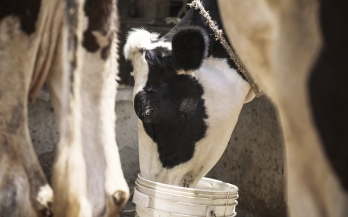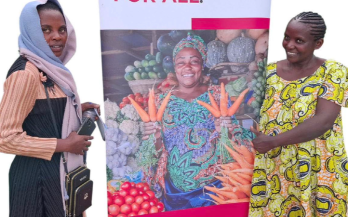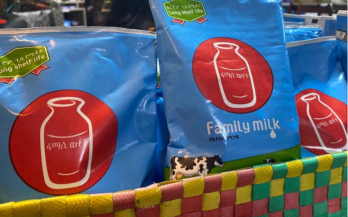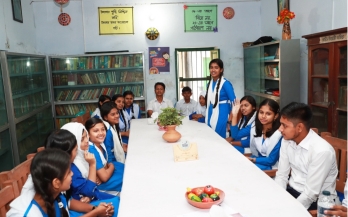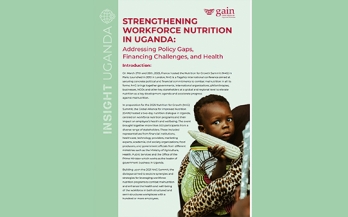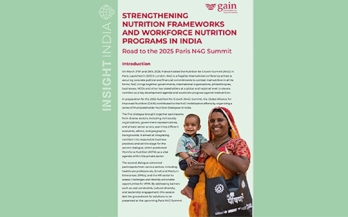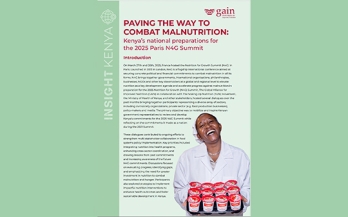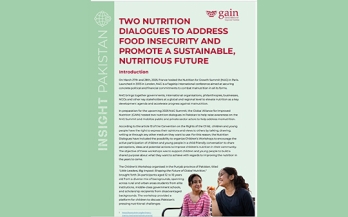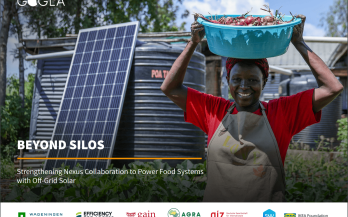Improving the quality of diets for rural populations is a key priority for many organisations – such as donors, implementing NGOs, and governments – in the nutrition sector. However, success at scale has been elusive.
GAIN, with the support of the Dutch Ministry of Foreign Affairs, embarked on a project to improve understanding of how to succeed at scale in rural settings. Eight other organisations (see background) also joined in this effort to pool their knowledge and experiences. Wellspring carried out a literature review in April-May 2024 and facilitated an in-person workshop in Utrecht in May 2024. This was followed by six online calls that focused on deeper discussion on six key topics identified based on the learning until then: dietary quality; segmentation; markets; scale; orchestration; and trade-offs.
Each topic has been covered under a separate GAIN convening paper. This overview aims to provide a short summary of each of the six topics.
Dairy products are rich in many nutrients essential for healthy growth and development, and they are often more affordable than other animal-source foods. Ethiopia has a very large stock of dairy animals, and milk and other dairy products are popular in the local food culture. Yet the per capita consumption of dairy is surprisingly low, reflecting numerous challenges in production, distribution, and household behaviours. This Working Paper reviews the experience of GAIN Ethiopia tackling some of these challenges in the dairy value chain.
This brief aims to
1. Describe the micronutrient malnutrition and LSFF programme context in Rwanda;
2. Identify challenges and opportunities to strengthen existing programs;
3. Provide practical, evidence-informed policy and programmatic recommendations; and
4. Catalyse multi-stakeholder collaboration to reduce micronutrient deficiencies.
Milk is a commonly consumed food in Low- and Lower-Middle Income Countries (LLMICS). It contains many important nutrients and generally appears, together with its derived products, in national dietary guidelines. But objections have been raised to its promotion on several grounds: health, environmental, animal welfare, and affordability. This Discussion Paper reviews commonly presented arguments in favour of and against consumption of dairy, taking into account the specific contexts of LLMICs.
While there is a growing recognition of the importance of youth engagement in food system decision-making and governance, existing research remains largely theoretical or anecdotal, with a scarcity of empirical studies providing robust data on the engagement and meaningful participation of young people in food systems. A first step towards providing such data is having strong, validated metrics and data-collection methods that can be applied comparably across contexts. This scoping review thus synthesises evidence on metrics and methods used to assess youth engagement in policy processes, with a specific focus on food system-related policies.
On March 27th and 28th, 2025, France hosted the Nutrition for Growth Summit (N4G) in Paris. Launched in 2013 in London, N4G is a flagship international conference aimed at securing concrete political and financial commitments to combat malnutrition in all its forms. N4G brings together governments, international organisations, philanthropies, businesses, NGOs and other key stakeholders at a global and regional level to elevate nutrition as a key development agenda and accelerate progress against malnutrition. In preparation for the 2025 Nutrition for Growth (N4G) Summit, the Global Alliance for Improved Nutrition (GAIN) hosted a two-day nutrition dialogue in Uganda, centred on workforce nutrition programs and their impact on employee’s health and wellbeing.
On March 27th and 28th, 2025, France hosted the Nutrition for Growth Summit (N4G) in Paris. Launched in 2013 in London, N4G is a flagship international conference aimed at securing concrete political and financial commitments to combat malnutrition in all its forms. N4G brings together governments, international organisations, philanthropies, businesses, NGOs and other key stakeholders at a global and regional level to elevate nutrition as a key development agenda and accelerate progress against malnutrition.
On March 27th and 28th, 2025, France hosted the Nutrition for Growth Summit (N4G) in Paris. Launched in 2013 in London, N4G is a flagship international conference aimed at securing concrete political and financial commitments to combat malnutrition in all its forms. N4G brings together governments, international organisations, philanthropies, businesses, NGOs and other key stakeholders at a global and regional level to elevate nutrition as a key development agenda and accelerate progress against malnutrition.In preparation for the 2025 Nutrition for Growth (N4G) Summit, The Global Alliance for Improved Nutrition (GAIN) in collaboration with The Scaling Up Nutrition (SUN) Movement, the Ministry of Health of Kenya, and other stakeholders, hosted several dialogues over the past months bringing together participants representing a diverse array of sectors, including civil society organizations, private sector (e.g. food production businesses), policy-makers and media. The primary objective was to mobilize and inspire Kenyan government representatives to review and develop Kenya's commitments for the 2025 N4G Summit while reflecting on the commitments it made as a nation during the 2021 Summit.
On March 27th and 28th, 2025, France hosted the Nutrition for Growth Summit (N4G) in Paris. Launched in 2013 in London, N4G is a flagship international conference aimed at securing concrete political and financial commitments to combat malnutrition in all its forms.
N4G brings together governments, international organisations, philanthropies, businesses, NGOs and other key stakeholders at a global and regional level to elevate nutrition as a key development agenda and accelerate progress against malnutrition. In preparation for the upcoming 2025 N4G Summit, the Global Alliance for Improved Nutrition (GAIN) hosted two nutrition dialogues in Pakistan to help raise awareness on the N4G Summit and mobilize public and private sector actors to help address malnutrition.
This white paper explores the nexus between food systems, infrastructure and energy provided by off-grid solar (OGS) systems.8, 9, 10 The efficiency, sustainability, and productivity of food systems are deeply intertwined with energy use.11 The agricultural sector accounts for 30% of global energy consumption and requires power for food production, storage, transportation and processing. The infrastructure used to power food systems is heavily reliant on fossil fuels, accounting for at least 15% of fossil fuel use globally.12 However, in sub-Saharan Africa, agricultural production consumes significantly less energy than the global average. This limits opportunities for value addition, increases food waste due to inadequate storage and processing facilities, and contributes to low agricultural yields.


